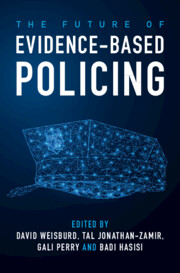Book contents
- The Future of Evidence-Based Policing
- The Future of Evidence-Based Policing
- Copyright page
- Contents
- Figures
- Tables
- Contributors
- Editors
- 1 The Future of Evidence-Based Policing
- Part I Taking Stock of Evidence-Based Policing
- Part II The Evidence for Evidence-Based Policing
- Part III Innovations in Tools of Evaluation and Assessment
- Part IV Challenges to the Implementation of Evidence-Based Policing
- 10 Practitioners’ Inclination to Rely on Experience
- 11 Implementing Evidence-Based Policing
- 12 Towards Implementing Evidence-Based Policing
- 13 Evidence-Based Policing and the Law
- Part V The Practitioner’s Perspective
- 17 Conclusions
- Index
- References
13 - Evidence-Based Policing and the Law
The American Perspective
from Part IV - Challenges to the Implementation of Evidence-Based Policing
Published online by Cambridge University Press: 01 June 2023
- The Future of Evidence-Based Policing
- The Future of Evidence-Based Policing
- Copyright page
- Contents
- Figures
- Tables
- Contributors
- Editors
- 1 The Future of Evidence-Based Policing
- Part I Taking Stock of Evidence-Based Policing
- Part II The Evidence for Evidence-Based Policing
- Part III Innovations in Tools of Evaluation and Assessment
- Part IV Challenges to the Implementation of Evidence-Based Policing
- 10 Practitioners’ Inclination to Rely on Experience
- 11 Implementing Evidence-Based Policing
- 12 Towards Implementing Evidence-Based Policing
- 13 Evidence-Based Policing and the Law
- Part V The Practitioner’s Perspective
- 17 Conclusions
- Index
- References
Summary
As social scientists seek to communicate research about what works in policing to police executives, they overlook important players in determining how informed by evidence policing will be: legal actors, including courts. This chapter argues that the law and research on policing influence each other in ways that shape evidence-based policing. First, the law alters what police practices are studied and therefore what practices are likely to become supported by social science evidence. It sometimes restricts or threatens to restrict police practices, making it less likely that researchers will devote attention to them. Other times it incentivizes research, by looking to it to determine the legality of police practices. And sometimes it supports social science work on policing by mandating data collection that facilitates research. Second, social science research on policing can change the content of the law. Not only legislatures but also courts look to research to answer questions about the effectiveness, fairness, and harmfulness of police practices that are relevant in legal decision-making. Given these interactions, researchers could improve both policing and the law by considering the needs of courts and legislatures as well as police executives as they contemplate and communicate future research.
- Type
- Chapter
- Information
- The Future of Evidence-Based Policing , pp. 252 - 270Publisher: Cambridge University PressPrint publication year: 2023



